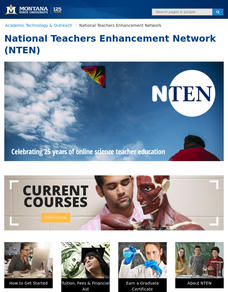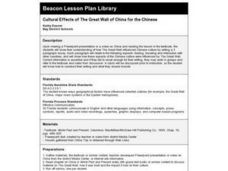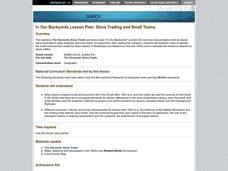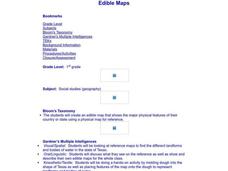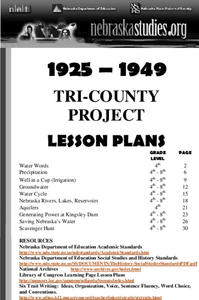Curated OER
The Great Society and A Thousand Points of Lights
Learners compare 2 preseidental speeches. In this presidential agenda lesson, students compare and contrast a Lyndon B. Johnson speech with a George H. W. Bush Speech.
Curated OER
Alternate Histories
Students create a mixed media collage. In this visual arts lesson plan, students look at the work of Jane Ash Poitras. They create their own collage that shows their personal and collective history and experiences.
Curated OER
Watershed Model
Students view a presentation of water and land and how we need to protect our water resources. In this water lesson plan, students discuss how we rely on water, and complete activities in all subjects related to water.
Curated OER
Amazon Rainforest Unit
Students study the Amazon Rainforest. In this geography skills instructional activity, students complete assigned textbook reading on the region and then complete an Internet activity that requires them to identify countries in the...
Curated OER
The 50 States
Fifth graders use maps and music to learn the 50 states. In this US Geography lesson, 5th graders map out a region of the United States and practice singing the song, The 50 States that Rhyme.
Curated OER
Under the Weather
Students consider the increase in floods. In this current events lesson, students visit selected websites to research the occurance of floods in Britain.
Curated OER
Not Just a Fish Tank
Students learn about a specific species of fish, study the effects of outside substances on the reproductive development of a fish, and explore the process of a wastewater treatment facility.
Curated OER
The U.S. Constitution Power Grab Game
Students study the powers and limitations of the three branches of the American government. They explain how the system of "checks and balances" protects the individual citizens. They explain how the amendments to the Constitution...
Curated OER
American Indian Tribal Sovereignty
Seventh graders examine the relationship among the governments of the sovereign American Indian Nations in Utah, the State of Utah, and the U.S. They list the objectives of the Office of Indian Affairs and examine their purpose.
Curated OER
Demonstrating Erosion in Action
Students easure and record volume of water, then measure and record mass of soil. They explain the effects of the following in controlling erosion: Contouring, cover crop, strip cropping, reforestation, inter-seeding.
Curated OER
SHARK BODY PARTS
Students list all the parts on the shark and label a diagram of the shark anatomy. They define the words, "gill and fin" and describe what they are used for.
Curated OER
Peru Geography and the Environment
Fourth graders draw maps of Peru and examine how Peru is a geographically diverse country.
Curated OER
Cultural Effects of The Great Wall of China for the Chinese
Sixth graders write a three paragraph essay describing how three areas of their culture were affected by The Great Wall of China.
Curated OER
The Unification of Italy
Students process variety of information on how Italy became a nation, and answer series of short-answer questions on the topics discussed in class.
Curated OER
SLAVE TRADING AND SMALL TOWNS
Students research the ways slavery shaped social and economic life in the South after 1800, the different economic, cultural, and social characteristics of slavery after 1800, and how the Atlantic slave trade finally ended.
Curated OER
Lincoln's Spot Resolutions
Students examine the controversy and varying points of view leading up to the 19th century Mexican War. They research examples of anti-war movements throughout history and write editorials about their findings.
Curated OER
Salmon Homing Instincts
Young scholars role-play salmon returning to original streams using their sense of smell like the salmon do. They smell cinnamon, vanilla and peppermint on cards and follow that scent to locations in the classroom that represent their...
Curated OER
Edible Maps
First graders, in groups, identify major geographical features of Texas. They form a topographical map of Texas using edible dough, candy, etc. They present and then eat their maps.
Curated OER
Animal Tracks - Walking and Running
Students, using paper and water, make tracks and record the time needed to make them. They compare tracks made walking and running to determine the speed of the animal.
Curated OER
Silk Roads Big Map
Students create an oversized map from Europe to East Asia. They include information such as Silk Roads, geographical features, major cities and cultural information on their map.
Curated OER
Of Maps and Worldviews
Young scholars explore Ptolemy's world map as an expression of the Renaissance view of the world.
Curated OER
Postcards from California: A Unit on Geography, Social Studies, History and California's Resources
Fourth graders examine patterns that influence population density in the various regions of California. The unit's three lessons utilize graphic organizers for the interpretation and presentation of data.
Curated OER
Scavenger Hunt
Students summarize the "Tri-County Project" section of the nebraskastudies.org web site using a scavenger hunt.
Curated OER
Geography of China
Young scholars research Chinese dynasties and write papers on them. They conclude by making comparisons between eastern and western cultures.











